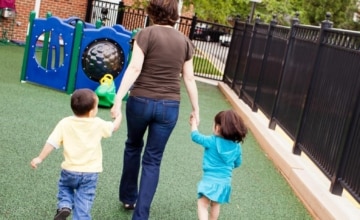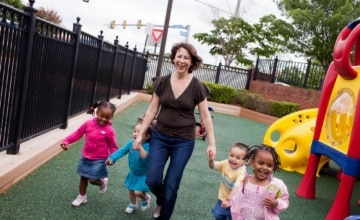When you make time to play each day, you are giving your child a big dose of love and learning.
“Play is often talked about as if it were a relief from serious learning. But for children, play is serious learning. Play is really the work of childhood.” Wise words from Mister Rogers. Play is serious learning. It’s more than just fun. It’s a very important part of growing up. And it happens from day one of a child’s life. Even small babies play. Here’s what you can expect as your child grows and develops.
Birth to 12 Months
 Babies this young don’t need toys to play. They love simple exchanges with you.
Babies this young don’t need toys to play. They love simple exchanges with you.
What She Can Do
Your baby uses her body to explore. She makes discoveries and learns largely through her senses. Baby uses her eyes, ears, nose, hands, and mouth (especially her mouth!) as tools to explore her surroundings.
What’s She’s Learning
As your baby grows, she will also begin to reach and grasp. This builds her eye-hand coordination. She’s starting to understand cause and effect. She is learning that shaking the rattle will produce a fun sound. Your baby is also learning to communicate. By the time your baby is about 8 months old, she will have lots of ways to communicate. She may “talk” using gazes, gestures, facial expressions, and sounds. This is her way of telling you what she’s thinking and feeling, and what interests her.
How You Can Help
You don’t need toys to play with babies this young! They love simple exchanges. Try peek-a-boo or holding her while dancing. You can also coo and “talk” to your baby. Imitate her sounds and wait for a response. Encourage her to copy you, too. Remember that it’s perfectly normal for her to put toys in her mouth. Offer only baby-safe objects to explore and watch babies closely as they play.
12–24 Months
 Toddlers this age have a lot of energy and a drive to explore!
Toddlers this age have a lot of energy and a drive to explore!
What He Can Do
Your toddler likes to investigate spaces, toys, and everyday objects. He will learn to stand, walk, jump, and climb. He’s also able to use his fingers and hands to play in more complex ways. He’s learning to push buttons, open boxes, and turn pages. Your toddler also loves repetition as he figures out how things work. For example, he might fill and empty a bucket over and over.
What’s He’s Learning
Your toddler’s play helps him learn new concepts. He will discover up and down, full and empty, in and out. He is also using imitation to begin learning about the world of pretend. He will pretend to talk on the phone or copy how you use a spoon to stir a pot. Your toddler is developing new language skills. These skills help him understand and communicate more than ever before. These new skills boost his self-confidence, which means he will want to do more “all by myself.”
How You Can Help
Follow your child’s lead. Let your child decide what’s fun (within safe limits) and join in. Every child is different, and yours will have his own preferences. His play doesn’t always have to be full of action. He might prefer quieter activities. Perhaps he likes to look at books, build with blocks, or listen to music. It’s important to offer a variety of types of play. This approach gives your child the chance to learn and practice skills like building, jumping and climbing, pretending, and matching. Different activities grow different parts of the brain. Be understanding if your child moves quickly from one activity to another. Toddlers this age have a short (but growing) attention span and a drive to explore!
Tweetable Takeaway
Play is serious work for little ones! When they reach, chew, babble, build, climb, pour, and play pretend, they’re busy discovering the world.
24–36 Months
 A growing imagination leads to creative play ideas for older toddlers!
A growing imagination leads to creative play ideas for older toddlers!
What She Can Do
Your child will use her imagination more. She may act out stories like driving a truck, going to “work,” or baking a cake. Your child might make up stories and rules for her games. In fact, when you play together, she may really enjoy telling you what to do! Your child may also bring conflicts and emotions to her pretend play. For example, after a trip to the doctor, she may act out the appointment with her teddy bear. Toddlers are also developing more mature problem-solving skills. They may now enjoy different types of blocks, puzzles, and construction toys as fun challenges.
What’s She’s Learning
Older toddlers are beginning to show interest in playmates. Months earlier, she may have just watched others playing or played side-by-side with peers. Now, she is beginning to play with friends. Sometimes even without arguments! Playing together provides great opportunities to learn, communicate, share, and resolve conflicts.
How You Can Help
Your older toddler still loves to play with you. As you play, help her expand and build on her ideas. Ask how the stuffed dog feels or wonder together why the block tower fell down. Model new vocabulary. (“These blocks are equal—they are both same length.”) Offer new challenges to explore. Create an obstacle course, build a blanket tent, or try a new puzzle together. Try musical games like “Freeze” and “Hokey-Pokey.” These games offer opportunities to listen, follow directions, and practice self-control. They also allow children to move their bodies. Don’t be surprised when your child has strong feelings or a temper tantrum when it’s time to stop playing. This is typical behavior for 2-year-olds. Sometimes it helps to give her reminders that playtime will end. Offer a countdown that it will be over in “5 minutes, 2 minutes, 1 minute.”
Your Child and Play
Play is practice for real life. It gives young children an opportunity to learn and practice new skills. It offers an outlet for expressing themselves and working through powerful feelings. Most important, play brings joy. And you are a big part of that fun! What makes play so special is that your child has your full attention. When you make time to play each day, you are giving your child a big dose of love and learning.




